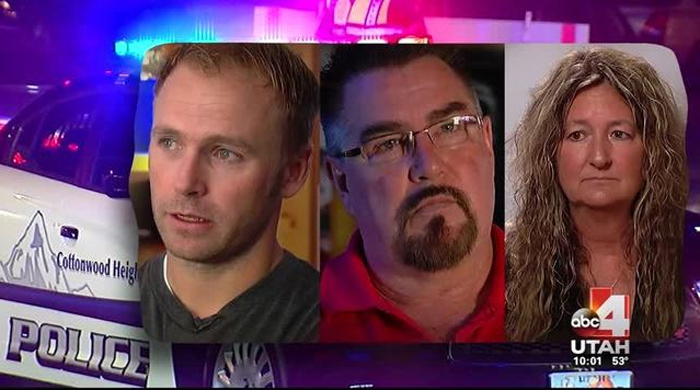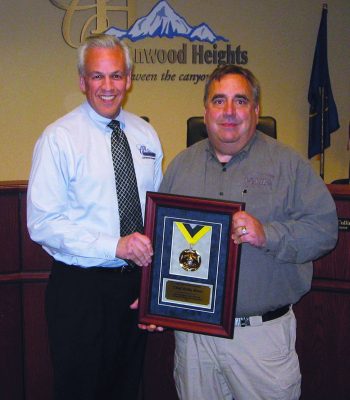
Utah Stories was started ten years ago to offer an independent source of journalism, with a bent toward examining the harmful effects of crony capitalism. The abuse of power in municipalities runs rampant because the suburban cities have a record number of developers, land speculators, and real-estate brokers who also happen to be politicians. This power goes unchecked because there is an absence of authentic local media coverage.
When UtahStories.com kicked off ten years ago, we made it a part of our mission to examine the suburbs, where Walmart’s, ShopKo’s, and corporate chain strip malls pop up like weeds, bloom and flourish—while local businesses become overshadowed and struggle to survive.
This is because of the strange hybrid creature called developer/politician, or Developosaurus. These odd creatures lurk around corners in city council halls; an astute observer quickly learns these are the guys pulling the strings, maintaining the power, and consuming the corporate welfare and handouts at the expense of locally-owned businesses who get only scraps… if they’re lucky.
Our conclusion? This isn’t a “free market” at all, but a government plutocracy predetermining the winners and losers. In this model, the system is indeed rigged, and this is one big reason why the rich are getting richer and the poor are getting screwed.
Our first story on the suburbs was on the Quarry Bend development. Slated to become Sandy City’s own version of Sugar House Park, Quarry Bend was promised to be a 50-acre park with jogging trails, fields, open spaces, playgrounds, and a pond. However, something terrible happened nobody saw coming: Sandy lost their Walmart on State Street. It closed it’s doors and moved into a much larger “Supercenter” in Draper.
Without the tax-revenue-generating machine that WalMart provided, Sandy’s Mayor and City Council had to act fast. In doing so, they saw the perfect place for not only a Walmart, but other big box stores and strip malls. The developer/politicians saw a potential gold mine in the “Quarry Bend Park.” The Sandy City Council voted unanimously to turn the park into a big-box and stripmall mega-center known as Quarry Bend.
A group of ladies who had been looking forward to the park banded together and formed a group called “Save Our Communities.” Unfortunately, they didn’t have a chance. Walmart’s PR arm did the groundwork of convincing residents not to sign their petition. Their campaign convinced residents that enjoying acres of open-space, trees, and a pond paled in comparison to enjoying super-low prices at Walmart. Further, they argued the city would gain tremendously from the tax revenue generated, that they could use that tax revenue to fight crime and make neighborhoods safer.
Ever since this sad story transpired, with nearly no coverage by the mainstream media, we believed we found a gap—a niche we could fill with our method of authentic local journalism that could possibly make a difference. Fast forward eight years when, in 2015, we were four years into our suburbs issue.
The Great Media Disappearing Act
Sixteen months ago ABC4 news called when I was in Moab. “Hi Richard, it’s Kim Fisher. We are producing a piece on Cottonwood Heights government corruption and I wanted to get your input on the story. Can I ask you a few questions?” “Of course!” I said. I was thrilled that this important story that was so neglected, especially by TV news, was finally receiving some greater examination. I told Kim I would help in any way I could.
I had just published a story for the Cottonwood Heights City Journal and went through a fiasco regarding the number of actual issues being printed and delivered to homes, which was 4,200 copies rather than the 17,000 copies the publisher promised. But the story I produced for them was doing incredibly well online and the video Utah Stories produced was receiving thousands of views and hundreds of comments.

The gist of the story was how a former Cottonwood Heights police officer had come forward and accused Cottonwood Heights Mayor, Kelvyn Cullimore, of directing his police department to put the Canyon Inn (a beer and liquor bar) out of business. This corroborated the evidence Canyon Inn owner, Jim Stojack, had—hours of video footage showing how, sometimes, up to seven police cars surrounded his bar, harassed customers, and issued citations, including bogus DUIs. Stojack’s Canyon Inn went from thriving to dying in a matter of one year.
Soon, other area business owners were complaining about the heavy-handed police treatment including the owners of The Lift House, Porcupine Pub, and 7-11, all at the mouth of Little and Big Cottonwood Canyons. These were all independently-owned and operated businesses, not under the control of the developer/politicians.
Stojack’s complaints to the Mayor’s office and to police officers fell on deaf ears. When Utah Stories sat down for an interview with Mayor Cullimore to get his side of the story, he called Stojack, “A rabble rouser, looking for someone to blame for his failing bar.”
Utah Stories produced a short film, highlighting Stojack’s footage, which received over 20,000 views on YouTube in two weeks. This must have attracted ABC4 to the story. There is no question about the veracity of Stojack’s claims when one watches Stojack himself being pulled over and harassed by an officer who made up multiple bogus claims as to why he was stopped.
“Why are you pulling me over, officer? I am videotaping my speedometer, going well within the speed limit. I am obeying all the traffic laws.”
“You didn’t put on your blinker before you changed lanes.”
“Oh yes I did, I can show right here on my video recording.”
“Uh yeah— the real reason I pulled you over is that you failed to yield to an oncoming vehicle.”
“What oncoming vehicle?”
“My vehicle,” the officer replied.
“You have got to be kidding me!” Stojack said in disbelief.
Stojack was then cited and given a ticket for failure to yield to an oncoming vehicle, which he spent months fighting in court, just as many of his once-loyal customers were fighting their own citations.
This is just one of several examples of clear police overreach caught on tape. Another documented example shows officers using Canyon Inn’s parking lot to swap a prisoner from one police car into another.
To find more factual evidence than just video footage, we submitted a Freedom of Information request for DUI records. These reports showed that Cottonwood Heights Police Department (CHPD) wrote over 305 DUIs in 2011, 14 of which were overturned in court. The previous year in 2010 just 158 DUIs were issued. Mayor Cullimore and Police Chief, Robbie Russo, were completely unapologetic. They claim the majority of the DUIs that were overturned in Holladay court was from an officer who was called to serve in Afghanistan. And Cullimore says, “Why would I apologize for making our roads safer?”
In October 2015, ABC4 ran the first part of the Cottonwood Heights story where they examined the DUI scandal and the targeting of the Canyon Inn. They interviewed 7-11 Owner, Lani Roberts, and over the phone, the same anonymous source I interviewed for my story, the former CHPD police officer who had come forward about the targeting of the Canyon Inn. He also said that the firing of officer Beau Babka, for fueling his personal vehicle using his government-issued credit card, was common practice (among officers), and that Babka was a fall-guy when he began speaking out against the heavy-handed treatment of targeting a bar with harassment.
I spoke to ABC4 Reporter, Kim Fisher, and asked why they didn’t run the multiple parts to the story that both Stojack and Roberts were told would aired. Fisher said, “We were never going to run multiple parts.” I then asked if there was any fallout after the story ran, and Fisher said there was a huge amount of fallout, the details of which she didn’t want to talk about on the record, but that the rare investigative story produced by ABC4 was not something they were going to spend anymore time researching. “We saw a lot of smoke, but no fire,” Fisher says.
Apparently eyewitness testimony of a former CHPD Officer saying that he listened, watched, and took part in the targeting of a bar for harassment by a police department amounts to blowing smoke, or that Stojack’s hours of footage of a half dozen police cars circling his bar like vultures is merely smoke.
While we were investigating this story, dozens of Cottonwood Heights residents came forward to speak out about the harassment they had personally undergone. One LDS dentist claimed he was pulled over and examined when an officer suspected him of drinking, but he had never been assumed guilty of drinking. In fact, he had never drunk a drop of alcohol in his life. His offense was driving home late at night and passing by the Canyon Inn while it was being targeted by the CHPD.
The Dancing Man, Steven Unger, was also cited, handcuffed, and placed in the back of a hot police car for over an hour for dancing on the side of Van Winkle Boulevard. This incident added further fuel to the fire of CHPD harassment allegations. As this “Dancing Man” story gained widespread media attention, Robby Russo issued a public apology. Unger was hoping to see his day in court when CHPD suddenly dropped the charges.
This story has, for all intents and purposes, disappeared from all main-stream attention. The force of the CHPD’s “DUI crackdown” came in 2012, just two years after Cullimore and Russo came to power and disbanded from Salt Lake County’s Unified Police Department; and just five years after Cottonwood Heights became its own city. CHPD broke away from Unified with the aid of Robby Russo double-crossing Unified’s Sheriff, Jim Winder, pretending to be aiding the new city, when he was actually working with Cullimore to disband from Unified’s county police force. Sheriff Winder and Mayor Cullimore have had an adversarial relationship ever since this.
Lani Robert’s, 7-11 owner, has made many complains and written dozens of letters to local authorities complaining how the cops would “camp out in my parking lot, harassing my customers, while they were waiting to pull over Canyon Inn customers.” Robert’s 7-11 store is one of the highest-volume 7-11 stores in the country. After multiple complaints about the police presence, her store was the target of what she described as “monthly” DABC sting operations.
When finally one of her employees failed to ID a sting officer, local authorities attempted to hold her personally responsible, which would potentially revoke the store’s license to sell beer. Roberts had to spend $13,000 fighting the charges in court. She eventually won. She then spent another year in court attempting to sue for reimbursement of her court costs, but she ultimately decided the time she was wasting was not worth the effort.

The especially bothersome aspect of this story is that Cullimore and Russo have completely gotten away with misdeeds and clear civil rights violations. Title 42 of the United States Code, Section 1983, makes it unlawful for anyone acting under the authority of state law to deprive another person of his or her rights under the Constitution or federal law. The most common claims brought against police officers are false arrest (or false imprisonment), malicious prosecution, and use of excessive or unreasonable force.
The CHPD case was never considered for review by Attorney General, Shawn Reyes, nor was there ever a Department of Justice or an FBI investigation. Certainly, municipal justice issues deserve at least a minimal amount of scrutiny by higher authorities.
From this reporter’s point of view, a Mayor and a Chief of Police have gotten away with putting a bar out of business, and in the process, severely harmed business owners and the lives of residents who have been the recipients of undeserved harassment and bogus DUIs.
Local K-Talk reporter, Kyle 2K, covered the Canyon Inn story extensively on his call-in radio talk show in 2015. Two months after he began reporting on the story, his show was mysteriously canceled.
KNRS talk show host, Rod Arquette, also picked up the story and interviewed Mayor Cullimore on-air. Cullimore used the same talking points he always used, personally attacking Stojack, 2K, Janalee Tobias, Babka and the media who were were responding to the clear evidence.
Then suddenly, radio, TV, and print coverage all went silent. Especially noticeable was the canceling of Kyle 2K’s show, silencing the voice of the most outspoken advocate for Cottonwood Heights justice.
Despite conspiracy theories flying, 2K says that his departure from KTALK had nothing to do with the Canyon Inn.
2K was on the air for ten years. Not long after 2K left, Janalee Tobias, who was also a strong advocate for the Canyon Inn also left.
The TV news coverage ended as well. Asking Roberts if she was certain that ABC4 was going to run more parts, she replied, “Absolutely. And when I asked when the other parts would be aired, they told me they were working on it.” Now Roberts says, “For some reason they are afraid. And what are they afraid of? Losing their jobs. Why?” she inquired.
Without going into details, Kim Fisher indicated there was backlash from CHPD and Cullimore’s office after airing the story. But she declined to go on the record about any details.
Utah Stories interviewed ABC4 News Director, George Severson, who said, “There was not much backlash.” However, further inquiry revealed that ABC4 was blackballed by Cottonwood Heights official press conferences by not being invited when other media outlets were.
“I called Russo and my temper got up and his temper got up, and I said if this is about our past stories then you need to grow up and get over that. And that’s when I went over there and I was happy with that meeting. The takeaway was that we have a job to do and you have a job to do. And I stand by Kim Fisher, and they might not think it was respectful but we believe it was,” said Severson.
In this reporter’s opinion, ABC4 was intimidated and Severson backed off the story, as did every other major news outlet, because they believed, despite all the evidence, that this story was too complicated and had too many moving parts to pursue. Still, I applaud Kim Fisher and Director Severson for at least doing what they did.
When the majority of local TV “news” these days consists of viral YouTube videos, car crashes, shootings, rapes, and even a recap of The Bachelor, it’s nice to see a real story and actual journalism being conducted for the benefit of the public.
The first time I actually met Robby Russo and introduced myself, his response was, “So you are that shitty reporter writing all that shit about us!” We later came to terms and he shared the results of his own “internal affairs” investigation with his own DUI data. This data didn’t correspond with the data we received from a GRAMA request we conducted with Holladay Court. We last reported on this story 14 months ago, so why should we bring it up again?
We adhere to and believe what Benjamin Franklin had to say about free speech in 1784, that “A society only maintains its freedom when there is free speech, and any deterrent to free speech is a deterrent to freedom.”
We live in a freedom-loving country. Long live our rights to speak out and not be silenced. And hopefully, long live the media that is not afraid to report the truth and those courageous individuals who speak out for truth and justice, like Lani Roberts, Kyle 2K, Janalee Tobias, Jim Stojack, and Beau Babka—who all spoke out against this injustice for years despite the personal and political harm it caused them.
Even after Jim Stojack had collected over 2,000 signatures from residents who were speaking out against the “CHPD’s heavy-handed treatment,” the Canyon Inn closed for good in October 2015.
I have heard from several people that this story has been repeated numerous times across the United States because local municipal police departments are maintained with little to no actual oversight in our judicial system. This needs to change. The power of the developosauruses needs to be held in check.
Utah Stories is very grateful to all the men and women in blue who courageously work for our public safety as police officers. We know that the majority of police officers are honorable public servants who deserve our respect and gratitude.
Previous Stories on Cottonwood Heights





